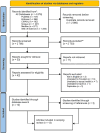Integrating sexual and reproductive health into pre-travel consultations
- PMID: 38340322
- PMCID: PMC11149722
- DOI: 10.1093/jtm/taae024
Integrating sexual and reproductive health into pre-travel consultations
Abstract
Background: Casual sex during travel is a major preventable factor in the global transmission of sexually transmissible infections (STI). Pre-travel consults present an excellent opportunity for practitioners to educate travellers about sexual and reproductive health (SRH) and safety. This scoping review aims to explore and understand the extent to which SRH is included in pre-travel consultations.
Methods: PubMed, Embase, Cumulative Index to Nursing and Allied Health Literature, Scopus, Medline and Web of Science were systematically searched for primary research articles exploring whether health care practitioners (HCP) included SRH in pre-travel consultations. Extracted findings were synthesized and presented in narrative form.
Results: Findings across 13 articles suggest HCPs infrequently broached SRH in pre-travel consultations with HCP discomfort, and lack of time and resources presented as key barriers. Urban practice settings, HCP experience, training in travel medicine and traveller characteristics such as sexual orientation were positively associated with discussions about SRH. SRH advice reported was general in nature, primarily focusing on safer sex, condoms or unspecified STI advice. Risk assessments based solely on age or stereotypes around sexual preferences led to key aspects of SRH care being missed for some (e.g. SRH was less likely to be discussed with older travellers).
Conclusions: HCPs frequently miss opportunities to integrate SRH into pre-travel consultations. Strategies to promote HCP confidence and awareness present a promising means to boost the frequency and quality of SRH advice disseminated. Integrating culturally safe and responsive SRH history-taking and advice into pre-travel consultations may contribute to global reductions in STI transmission and promote traveller SRH well-being.
Keywords: Travel; provider; reproductive health; review; sexual health.
© International Society of Travel Medicine 2024. Published by Oxford University Press. All rights reserved. For Permissions, please e-mail: journals.permissions@oup.com.
Figures
Similar articles
-
The provision of sexual and reproductive health information and services to travellers: an exploratory survey of Australian travel medicine clinicians.Sex Health. 2024 Jan;21:SH23098. doi: 10.1071/SH23098. Sex Health. 2024. PMID: 38219736
-
Understanding sexual and reproductive health need of unmarried adolescents and youth in urban slums: evidence from a formative study in Uttar Pradesh, India.Reprod Health. 2025 Jun 19;22(1):103. doi: 10.1186/s12978-025-02025-x. Reprod Health. 2025. PMID: 40537765 Free PMC article.
-
Population-based interventions for reducing sexually transmitted infections, including HIV infection.Cochrane Database Syst Rev. 2004;(2):CD001220. doi: 10.1002/14651858.CD001220.pub2. Cochrane Database Syst Rev. 2004. Update in: Cochrane Database Syst Rev. 2011 Mar 16;(3):CD001220. doi: 10.1002/14651858.CD001220.pub3. PMID: 15106156 Updated.
-
Interventions for interpersonal communication about end of life care between health practitioners and affected people.Cochrane Database Syst Rev. 2022 Jul 8;7(7):CD013116. doi: 10.1002/14651858.CD013116.pub2. Cochrane Database Syst Rev. 2022. PMID: 35802350 Free PMC article.
-
How to Implement Digital Clinical Consultations in UK Maternity Care: the ARM@DA Realist Review.Health Soc Care Deliv Res. 2025 May;13(22):1-77. doi: 10.3310/WQFV7425. Health Soc Care Deliv Res. 2025. PMID: 40417997 Review.
Cited by
-
Acceptability and feasibility of pre-exposure prophylaxis for bacterial STIs: a systematic review.PLoS One. 2025 Feb 6;20(2):e0317669. doi: 10.1371/journal.pone.0317669. eCollection 2025. PLoS One. 2025. PMID: 39913625 Free PMC article.
-
"Are they going to recollect who they need to contact?": understanding sexually transmitted infection transmission risks among older Canadians who winter in the United States.Trop Dis Travel Med Vaccines. 2025 May 7;11(1):11. doi: 10.1186/s40794-025-00245-4. Trop Dis Travel Med Vaccines. 2025. PMID: 40329430 Free PMC article.
References
-
- Deane KD, Parkhurst JO, Johnston D. Linking migration, mobility and HIV. Trop Med Int Health 2010; 15:1458–63. - PubMed
-
- Ward BJ, Plourde P. Travel and sexually transmitted infections. J Travel Med 2006; 13:300–17. - PubMed
-
- Rogstad KE. Sexually transmitted infections and travel. Curr Opin Infect Dis 2019; 32:56–62. - PubMed
-
- Steffen R, deBernardis C, Baños A. Travel epidemiology--a global perspective. Int J Antimicrob Agents 2003; 21:89–95. - PubMed
-
- National Academies of Sciences E, Medicine, Health. et al. Washington (DC). In: Crowley JS, Geller AB, Vermund SH (eds). Sexually Transmitted Infections: Adopting a Sexual Health Paradigm. National Academies Press (US)Copyright 2021 by the National Academy of Sciences. All rights reserved, 2021. - PubMed
Publication types
MeSH terms
Grants and funding
LinkOut - more resources
Full Text Sources
Medical
Miscellaneous


